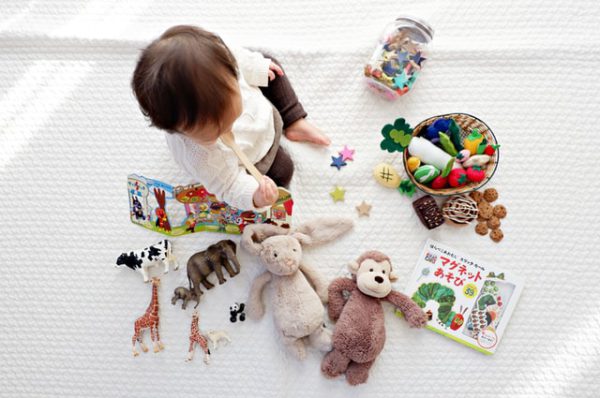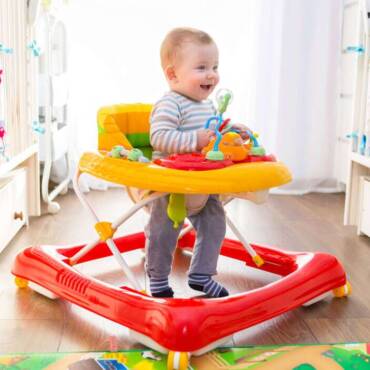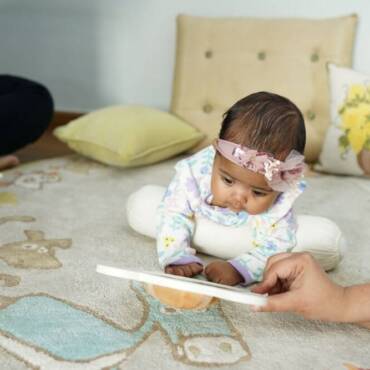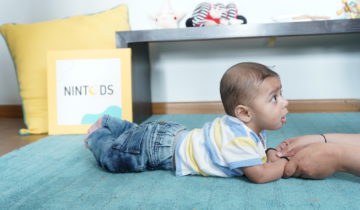Playtime is a major part of your little one’s development. From cognitive and physical development to emotional and social growth, the importance of play is undisputed. One of the smartest steps you can take is to engage your newborn in brain – boosting play activities via playtime – AND IT’S EASY TO DO
Play helps your baby’s brain to develop and supports their overall learning and well being, as new play experiences help different parts of your baby’s brain to grow and link together. Through play, your baby learns about the world around them and how they can interact with it.
Playing with your newborn doesn’t have to be rocket science. Parents are the best plaything for a newborn baby. You could try these simple techniques as playing with your little one
Face to face play
Face time is the simplest, most engaging and pleasurable form of play for your baby. They love to watch your face. So make faces, smile, laugh, poke your tongue out and roll your eyes. These gestures of your not only makes your baby happy but also helps develop that bond between the two of you that will likely lay the foundation for a healthy relationship in the months and years to come. In older children too, face to face play enhances E.Q and encourages imitation
Hold your baby more often
Holding your baby close to you during face to face play, during talking time, singing time and other times throughout the day helps your baby learn to feel comfortable and safe in your arms. It facilitates skin to skin, which can strengthen the bond between you and your baby, enhance breastfeeding, fight postpartum depression, and even help regulate baby’s body temperature and heart rate. Physical touch, irrespective of age provides a deep sense of comfort and security
Talk to your baby
You can talk to your baby during everyday tasks such as diaper changes, feed time, bath time and even while playing with your baby face to face. As your baby grows older you can carry your baby in your arms and talk to them about what you are doing, in a multi-lingual home switch between different languages. It can really help your baby’s development and creates a loving, warm feeling
Sing to your baby
It’s great to sing to your baby and it’s even better to sing as you move his little hands through the motions.
Through singing you not only facilitate the language and comprehension skills of your baby but also add a new vocabulary to your baby’s book of learning. It also brings about a sense of awareness and attention in your newborn. Singing may also help in feeding and sleeping, as it regulates the baby’s moods, which in turn positively affect the baby’s growth and development
Dance with your baby
Dancing with your baby is a great way to sneak in some tummy time. As the baby flies through the air, it exposes the baby to big movements, and it also prepares your baby’s body for learning to roll. You can also try calming your baby by dancing around the room in a slow rhythmic motion
Give your baby textures to feel
The world is a vast sea of new sensory experiences for the newborn. Provide them a variety of ways to explore numerous textures and the environment safely. This is important for the overall development of your baby’s tactile and sensory skills. The development of these skills contributes to good fine motor/hand skills later on. So feel free to place a variety of household things, fabrics and age appropriate toys like balls, links, rings, rattles etc
Give your baby something to look at
During first three months of life your baby’s visual system will transition from being unable to coordinate the eyes and only being able to see highly contrasting colours, to being able to discriminate some colours and visually follow slowly moving objects. You can decorate baby’s room with bright colours and bold patterns and play with your baby by dangling age appropriate toys one foot away from their face as you talk or sing to your baby. Your baby may also enjoy visually stimulating things like shiny objects, glitter jars, baby mobile, plastic mirrors etc
Tummy time
Tummy time plays a big part in baby’s growth and development, so let your baby spend some awake time on his/her tummy to help strengthen the neck, shoulder and back muscles
Read to your baby
You can start reading to your baby from birth. Start with books that have highly contrasting colours (black and white) and simple pictures. Reading aloud exposes your baby to language, rhythm, sentence structure and best of all, your voice, and in a few weeks your baby will start to recognize words and learn to listen to what others say
Floor time with your baby
To get the best out of all the above activities you should try and get down on the floor with your baby. Every single motor skill you baby will develop during the first year- skills such as rolling, pushing chest off the ground, sitting, crawling, cruising and walking – is the result of time spent playing on the floor
Imitate your baby
Imitation is an important way to help baby learn. You can try making funny face, or shake your head or even making different sounds and it would be so entertaining to see your baby repeat the same for you
Playtime can be fun both for the parent and for the baby- and has many additional benefits for your little. But don’t beat yourself up and don’t feel guilty if you don’t get to do all of these things every day. The most important thing during the first few months would be to hold your baby and talk to them as often as you can.
Enjoy the journey …
Play with Purpose !!




11 Comments
Wow, fantastic blog layout! How long have you ever been blogging for?
you made running a blog glance easy. The entire look of your site is excellent,
as neatly as the content! You can see similar here sklep
Hi! Do you know if they make any plugins to help with SEO?
I’m trying to get my blog to rank for some targeted keywords but I’m not seeing very good results.
If you know of any please share. Many thanks! You can read similar text here:
Sklep internetowy
Hi there! Do you know if they make any plugins to help
with Search Engine Optimization? I’m trying to get my blog to rank for some targeted keywords but I’m not seeing very good success.
If you know of any please share. Cheers! You can read similar text here:
Sklep internetowy
Hello there! Do you know if they make any plugins to assist with SEO?
I’m trying to get my blog to rank for some targeted keywords but I’m not seeing very
good success. If you know of any please share. Thanks!
You can read similar article here: Sklep internetowy
Hi there! Do you know if they make any plugins to help with Search Engine Optimization? I’m trying to get
my blog to rank for some targeted keywords but I’m not seeing very good gains.
If you know of any please share. Appreciate it! You can read similar blog
here: Sklep internetowy
Howdy! Do you know if they make any plugins to assist with Search Engine Optimization? I’m trying to get my website to rank for some targeted keywords but I’m not seeing very good results.
If you know of any please share. Appreciate it!
I saw similar blog here: GSA List
Hello! Do you know if they make any plugins to assist with Search Engine
Optimization? I’m trying to get my site to rank for some targeted keywords but I’m not
seeing very good success. If you know of any please share.
Appreciate it! You can read similar blog here: Link Building
Howdy! Do you know if they make any plugins to help with SEO?
I’m trying to get my website to rank for some targeted keywords but I’m not
seeing very good results. If you know of any please share.
Many thanks! You can read similar text here: Auto Approve List
Wow, marvelous weblog structure! How lengthy have you been running a blog for?
you make running a blog glance easy. The entire look of your site is
great, let alone the content material! You can see similar here
sklep internetowy
happy family rx
prednisone prescription cost
Add Comment